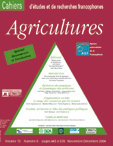Sugarcane industry preservation or local development? A case study in La Reunion.
Keywords
economy and rural development, territory, agricultural land, agricultural and food production policyAbstract
The agricultural policy of La Reunion island is concerned a great deal with the sugarcane industry. The overrepresentation of this production among the others is an inheritance of the times when the island was a "sugar island". Nowadays, things have changed. La Reunion and the economical activities it develops are inserted in multistage and embedded systems superimposed with local potentialities and constraints that cannot be ignored. Whereas European productivist agricultural policies are questioned and seek to develop the non-productive and non-commercial functions of agriculture, the sugarcane agricultural policy remains deeply influenced by the colonial past and evolves with difficulties. A close look at institutional practices relating to the maintenance of this industry and the protection of agricultural land shows the difficulties in reconciling productivist approach and territorial development.Downloads
Published
2004-11-01
How to Cite
Martignac, C. (2004). Sugarcane industry preservation or local development? A case study in La Reunion. Cahiers Agricultures, 13(6), 516–521 (1). Retrieved from https://revues.cirad.fr/index.php/cahiers-agricultures/article/view/30474
Issue
Section
Articles

